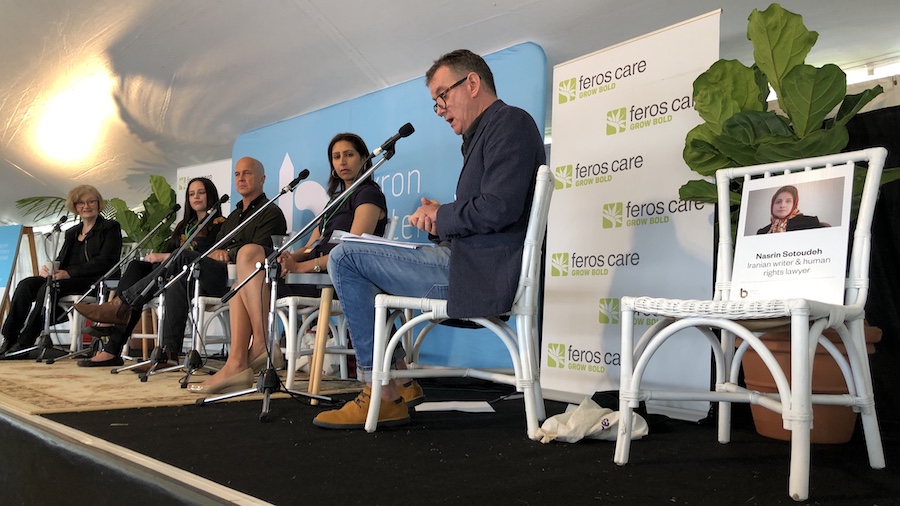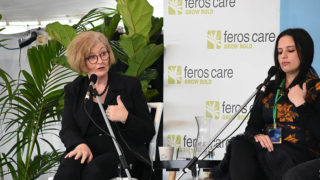How free is ‘free speech’?

The latest raids on journalists by the Australian Federal Police are a concern that strikes close to home for ABC presenter Paul Barclay, who chaired this session on free speech.
Before introducing the esteemed panel, Barclay drew attention to the Pen International ‘Empty Chair’ to his left.
The empty chair represents a long-standing PEN tradition to symbolise and honour a writer who has been imprisoned, detained, disappeared, threatened or killed.
On the chair’s backrest was the picture and name of Nasrin Sotoudeh, an Iranian writer, human rights lawyer and activist.
Sotoudeh was recently sentenced to 38 years in prison and 148 lashes, after providing legal support and advocacy for women who were facing charges for peacefully protesting Iran’s compulsory hijab law.
Free speech issues are global, but this session focussed on Australia where public interest journalists, whistleblowers and advocates are facing increasing pressure from government to stop reporting, whistleblowing and advocating.
Barclay asked, ‘how free are we?’ and ‘what are the greatest threats to that freedom?’, in light of the June 2019 AFP raids on the Sydney headquarters of the ABC and a News Corporation journalist’s home.
Journalist and media freedom advocate, Peter Greste, pointed out that the AFP raids are the result of having no constitutional protection for free speech or the media and because of this and the national security laws, the threat of going to prison is ever present.
This lack of constitutional protection, Greste said, gives the government scope to pass laws that ‘chip back’ at press freedoms.
Greste added that the AFP have been used more vigorously to conduct raids on journalists since 9/11 to shut down politically embarrassing information, under the guise of investigating ‘national security leaks’ to the media.
Some 70 national security laws have been passed in Australia since 2001.
Investigative journalist, Kate McClymont said these national security laws are used as a ‘pretext to muzzle the freedom of the press’ and stop them reporting on certain issues.
McClymont explained how, under these laws, a whistleblower who reports, for instance, on war crimes allegedly committed by Australian armed forces, can face six years jail.
If they hold a position with security clearance, the penalty for leaking information is 10 years jail.
Furthermore, a journalist who receives information from a whistleblower faces five years jail just for receiving the information.
The government’s argument is that these laws are in the public interest, however, McClymont questioned in whose interests are they really, ours or theirs?
Oncologist, author, columnist, and mother, Ranjana Srivastava added that closing down transparency in the media is problematic in safeguarding health. Shedding light on good and bad medical practices leads to an informed public.
Conversation then turned to the need for a wide range of perspectives to be included in the media.
Amal Awad, author of several books including Fridays with My Folks, argued that the media offers a ‘curated’ view of the world, and controls the voices that we hear and the stories that are run.
This extends to the diversity of voices, experiences and perspectives the public is exposed to, where Awal’s ‘barometer for progress’ is measured by how many stories are told by ‘authentic voices’.
‘If you want to understand, we can tell you,’ she said.
When Arab stories are told by Westerners through a ‘Western lens’, Awad argued, it is ‘reduced’ to a surface treatment; there is ‘still this sort of gaze’.
Awad also pointed out how the defence of ‘free speech’ has been used to support ‘hate speech’.
She gave the example that conservative columnist Andrew Bolt can engage in hate speech, which can be challenged but not criticised.
Greste offered some legal context on how to tackle hate speech. He said that if we ‘morally engage’, then the line we draw must be ‘incitement’—when hate speech incites violent acts.
Barclay asked about the hate speech, islamophobia and racism surrounding the recent Christchurch massacre.

McClymont said she finds it extraordinary that the people who ran videos of the killing thought it was appropriate to make that content public.
It is difficult to shut the stable door after the horse has bolted, she said, but banning people from speaking, depends on what they are inciting.
McClymont went on to say that what is needed is ‘decent public discourse’, but on social media there is a ‘complete breakdown’ of civil discourse.
Awad’s said the trouble with social media is that ‘people don’t read past the headline before reacting’.
This is why Srivastava said she chooses to step back from an issue, especially on social media, unless she feels she has something ‘that would add value to the debate’.
In response to Barclay’s questions about professionals speaking out, Srivastava explained how the doctor/patient relationship is sacrosanct and always asks, ‘will my writing hurt a patient?’ and ‘if I publish this, can I hold my head up tomorrow?’.
Barclay turned the conversation to news revenues and the shrinking of media funding, which all members of the panel felt very concerned about.
Greste warned that when news is treated not as a service but as a commodity to be traded, we get a trend where ‘rumour is favoured over fact, and speed over accuracy’.
McClymont expressed that she is deeply concerned about Facebook and Google ‘cannibalising’ news as a product and funnelling away revenue that should be going to news outlets.
She explains that since Fairfax was bought by Nine, content produced by those journalists have experienced the biggest readership they have ever had, with over eight million views per month; except there are still no financial rewards trickling down because of Facebook and Google.
Greste mentioned that just the threat of legal sanction is often enough to shut down journalistic enquiry, because especially smaller outlets cannot afford the time and money of legal proceedings.
With four defamation cases currently against McClymont, she knows firsthand how frustrating the legal system can be, especially since ‘truth is not a defence’ in defamation lawsuits.
Barclay’s final question was about WikiLeaks founder Julian Assange, who will face a hearing in early 2020 for an United States’ extradition attempt.
Should we be worried about how he is being treated?
‘Yes, we should,’ said Greste, explaining that he has the ‘utmost sympathy’ for what Assange has been through simply for trying to release information that was in the public interest, even if there was a problem with the ‘way’ Assange published the information.
Greste said Assange is likely to not be given a fair trial if he is extradited to the US, which has ‘serious implications for journalism broadly’.
Ali Rayner is a Southern Cross University Creative Writing student. Southern Cross University students have reported on Byron Writers Festival since 2010. Find out where a degree from Southern Cross University can take you.
